Rupert Murdoch certainly believed that he had played a major part in the 1972 Australian election result and that something was due to him, writes John Menadue.
“The prime minister was spotted at the media empire’s Holt Street offices on Wednesday, when, we’re told, Albo, Deputy Prime Minister Richard Marles and Foreign Affairs Minister Penny Wong met News Corp cochairman Lachlan Murdoch and senior editors of the media empire’s Australian mastheads”.(Sydney Morning Herald, Aug. 26, 2022)
By John Menadue
Pearls and Irritations
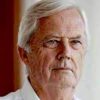 I don’t think Gough Whitlam [Australian PM 1972-75] would have trekked down from Canberra to Holt Street to pay his respects.
I don’t think Gough Whitlam [Australian PM 1972-75] would have trekked down from Canberra to Holt Street to pay his respects.
It was very hard to get him to make contact with Rupert Murdoch as I outlined in my autobiography ‘Things You Learn Along the Way,‘ (1999). Some extracts follow:
“Developing a relationship between Murdoch and Whitlam was difficult. The chemistry was never there. Whitlam was uneasy and sceptical of people with power and money.
He scorched their retainers as well. David McNicoll of the Bulletin opened his telephone call, ‘David McNicoll here, Mr Whitlam, I’m speaking for Sir Frank’. ‘David’, Gough replied, ‘I didn’t think you ever did anything else’!
I had quite regular contact with Whitlam but I was working hard at News Limited and he was working even harder to become prime minister. My main link to the Australian Labor Party (ALP) was Mick Young, who became Federal Secretary in April 1969. I probably saw him, usually with Eric Walsh and Brian Johns, for a long lunch or dinner every two or three weeks….
I found the run-up to the 1972 election campaign very exciting. Media power could be used for a purpose that I could identify with: the election of Whitlam. More often my energies had been committed to Murdoch’s goals.
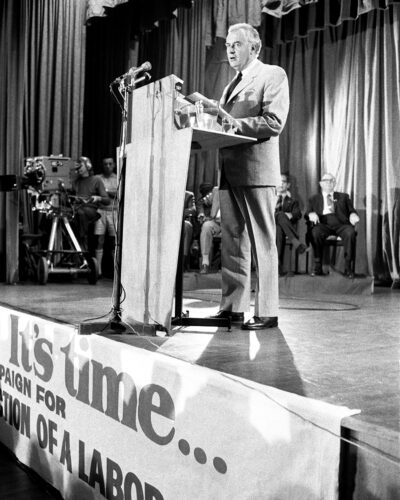
Gough Whitlam giving a speech during the 1972 election campaign. (National Archives of Australia, CC BY 4.0, Wikimedia Commons)
I arranged a dinner with Whitlam when Murdoch was back from overseas in July 1971. The dinner was at the Hungry Horse restaurant in Paddington. Attendees were: Rupert Murdoch; Ken May, News Limited’s managing director for Australia; Tom FitzGerald, who was editor-in-chief; Gough and Margaret Whitlam; and myself.
Murdoch wanted to get on the political inside. Whitlam wanted to talk about newspapers. The dinner conversation was polite but always cool.
In September 1971, Gough and Margaret Whitlam were invited to Cavan as overnight house guests. I had higher hopes this time. But the reports I got, particularly from Gough, were that it wasn’t successful either. He described the evening as one of the most ‘excruciatingly boring’ nights of his life. He is not good at small talk and again he was free with his advice about what he thought about Rupert’s newspapers. He was putting Murdoch in the dock.
Murdoch wanted to be the political confidant and Whitlam didn’t want it; it was as basic as that. So the relationship stuttered forward in a fairly desultory way.
Mick Young and I couldn’t see a great deal of progress. But we knew that Murdoch wanted desperately to support the ALP in 1972.
Murdoch didn’t like McMahon and he saw that Whitlam was a winner.
For Mick Young and me it was like trying to arrange a dance with mirrors.
As the 1972 election got closer, Murdoch talked to me a lot about what the ALP had to do to win. He was concerned about how the Labor Party could present its economic credentials. It didn’t have people with experience that could reassure the business community. It was at his suggestion that ‘Nugget’ Coombs was approached to be an adviser to a Whitlam government. Rupert felt that Coombs would give the ALP credibility in the big end of town. Mick Young and I sold the idea to Whitlam. The announcement worked to gee up the opening days of the 1972 campaign.
Murdoch was also very keen to have tax deductibility for housing interest repayments. He guaranteed extensive support for the proposal which Whitlam announced in his policy speech. Late in the campaign Murdoch proposed a competition for an Australian national anthem. Whitlam accepted and ran with that also.
But in very few instances were Whitlam and Murdoch in contact. It was usually done through Mick Young, Eric Walsh or me.
In their book, Making of an Australian Prime Minister, Laurie Oakes and David Solomon described my role: ‘The ALP’s main contact inside the News Ltd organisation was Menadue … He had not lost contact with Whitlam or his ties with the Labor Party and was in frequent contact with Mick Young in the months leading up to the election.’
About three weeks before the election, Mick Young and I spoke to Rupert about a social cruise on the harbour with Gough. He thought it a good idea. He was coming back from overseas and was in Australia for a few weeks before the campaign. He is always on hand for elections; he can’t keep away.
Mick and I organised the boat but weren’t sure who was paying. But we couldn’t get Gough to be in it. ‘I’m too fucking busy to see Rupert, I’m too fucking busy.’
We continued to press him but as a concession he offered, ‘I’m not going, but will Margaret do?’ I don’t think Margaret had been consulted at all.
We finally persuaded him that he had to come along for the boat ride. In the end it worked well, and Gough was courteous and relaxed. Rupert paid for the boat.
Murdoch was up to his ears in the campaign. Apart from some key people in the Labor Party, I don’t think anyone was more active in the campaign than he. He was writing speeches and forwarding them, through Mick Young or me, to Whitlam. I remember one press statement that Whitlam put out about the release of conscripts from gaol. I was with Eric Walsh as he spoke to Mark Day, editor of the Daily Mirror. Eric said, ‘It is a pretty good story that Gough’s put out on conscription’. Mark said, ‘Oh, it’s old hat, isn’t it? That’s all been said before.’ I remember Eric replying, ‘You’d better believe it’s new, because Rupert wrote it’. The story was carried.
During the campaign Murdoch used to get in very early to the office, sometimes write the editorial leader himself and see it down on to the ‘stone’ where the pages were made up under the old letterpress technology.
When Murdoch gave evidence in August 1975 in the Botany Council affair he confirmed that $74,257 for advertising was paid by News Limited.
As election day approached, News Limited papers progressively came on board, very destructive to the McMahon campaign and supportive of Whitlam. For the final rally of the 1972 campaign at St Kilda, Murdoch got Evan Williams, a very good writer and a staffer with The Australian, to write Whitlam’s final speech. He didn’t speak to Whitlam about it but I knew what was happening. I discussed it with Mick Young. ‘We’ve got a bit of a problem here. Rupert wants the final speech to be his.’ The speech was largely discarded, although there were a few ideas and lines picked up. Mick Young persuaded Whitlam to thank Murdoch.
Murdoch really pulled out all the stops to support the ALP. It was partisan and highly interventionist. But sooner or later the people whom Murdoch supports pay a price. It was to come three years later for Labor, in November 1975.
On the Monday after the 1972 election, Murdoch was going over the ALP victory with me. ‘How many seats do you think we won?’— ‘we’ meaning News Limited. There was no doubt that he helped create momentum, but the biggest swing to the ALP (six per cent) was in Victoria where his newspaper base was weakest. There were special factors in Victoria: the Labor vote had come back after the Split and the sacking of the incompetent and sectarian ALP State Executive in 1970 had been warmly received.
Murdoch hosted a dinner in Sydney at the top of Australia Square to celebrate the Whitlam victory. We all enjoyed the night. Sir John Kerr and the first Lady Kerr attended. The Whitlams always enjoyed her company. With an eye to the future, Murdoch invited Katherine Graham, the publisher of The Washington Post. She would have been impressed at how Murdoch could whistle up a prime minister. Neither she nor Murdoch knew how difficult it had been to get Whitlam to turn up. ‘Comrade’, he said, ‘I am not a national exhibit’—well, not then.
In 1972 our Christmas card from Rupert and Anna read, ‘With best wishes for Christmas and a Happy New Year’, to which Anna had added ‘but nothing can beat the last, a Labor Government and a new baby. Next year will be an anti-climax’.
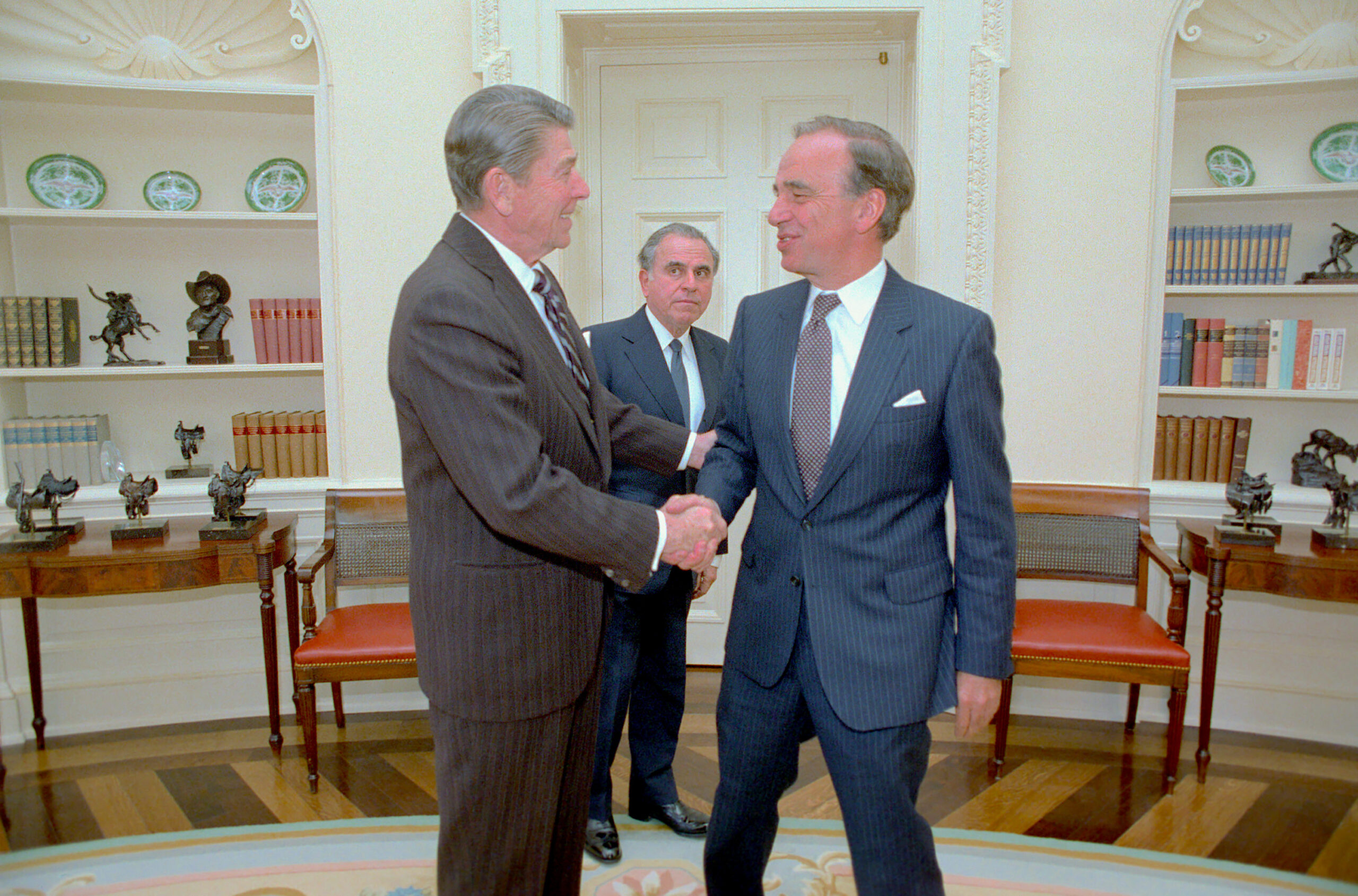
1/18/1983 President Reagan during a meeting with Rupert Murdoch with Charles Wick in the Oval Office. (White House Photographic Collection/Wikimedia Commons)
In his early days in business, Murdoch was content, like his father, to be close to those on the political throne. A direct telephone number was often sufficient. This changed in the late 1970s and 1980s when he came to believe that he could influence, or even better determine, who was on the throne, whether it was Whitlam, Fraser, Keating, Reagan, Thatcher, Major or Blair. There was probably no better illustration of his powers than in July 1995 when he hosted a conference of News International executives at Hayman Island…. Tony Blair, the Leader of the Opposition in the U.K., flew halfway around the world to attend and ingratiate himself. He was rewarded; Murdoch supported him against John Major in 1997. When Major was asked, ‘Were you upset by the London Sun’s defection?’, he replied, ‘I could feel that one coming. You can’t expect the mercenary to be consistent’.
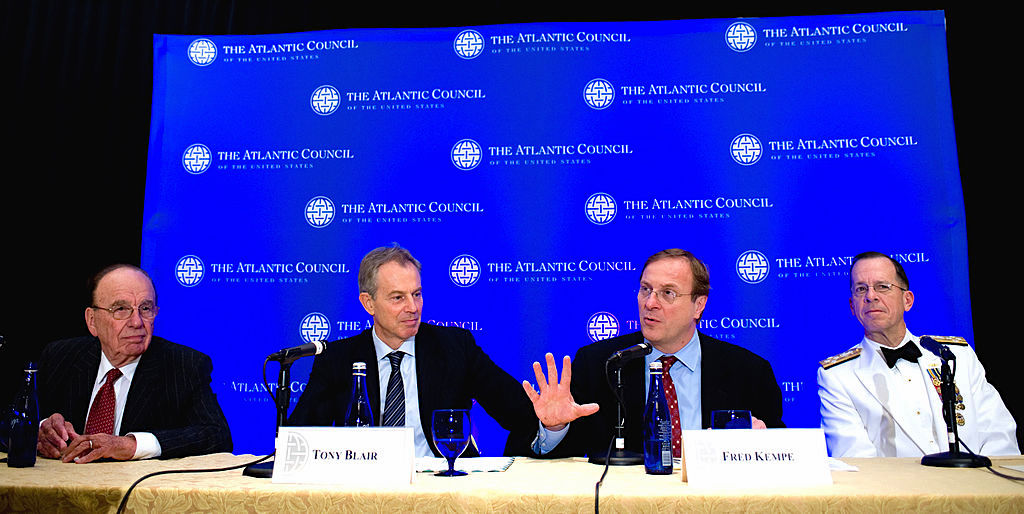
Rupert Murdoch, former British Prime Minister Tony Blair, Atlantic Council president Frederick Kempe and U.S. Navy Adm. Mike Mullen, chairman of the Joint Chiefs of Staff., April 2008. (Pentagon photo by U.S. Navy Petty Officer 1st Class Chad J. McNeeley)
I do think that Murdoch’s powers are overestimated, particularly by politicians. Murdoch’s papers are influential but, more importantly, he can pick public moods and trends and reinforce them. He will back political winners who he thinks can be made kings. Whosoever wins, Murdoch is determined not to be a loser. It didn’t need a king-maker to conclude that Whitlam would win in 1972, Fraser in 1975, Reagan in 1984, Thatcher in 1987 and Blair in 1997. Murdoch’s political power is that politicians think he can make or break them and they are not prepared to chance their careers on a gamble to find out. The perception is enough. Politicians now fall over themselves to advantage or at least not to disadvantage Murdoch.
Murdoch certainly believed that he had played a major part in the 1972 election result and that something was due to him. What he asked for was that he be appointed as Australian High Commissioner to London. He wasn’t seeking business favours. He wanted acceptance and recognition, and what could be better than a prestigious position in London where he could thumb his nose at the English Establishment, which had not accepted him?
Murdoch raised the appointment with me and explained that if he was the High Commissioner he would put his newspaper and television interests in a trust so there would not be a conflict of interest. He believed also that he could influence other Australian media proprietors and avoid media flak for the new government over the appointment.
He has since denied that he sought the High Commissioner’s job.
I raised it with Mick Young. The absurdity of it amused him. I put it to Whitlam on the phone. It was the Sunday morning a week after the election. We had a lengthy discussion. Whitlam had made a commitment to John Armstrong to appoint him the High Commissioner. Armstrong had been a Labor senator since 1937 and a former Chifley Government minister. He was very successful in London.
But Whitlam was adamant about Rupert for London. ‘No way’, he said.
After 12 months a person with Murdoch’s energy and ambitions he would have become bored with the job. But (London) was what he was after at the time.
As far as I could tell, he carried no grudge for the knock back. In the cold light of day he may have come to the view that the request was a bit rich. Setbacks, though, never slowed him down.
After the 1972 election, Whitlam was very busy and it was difficult once more to keep Murdoch and he in contact. Mick Young and I talked with Eric Walsh about doing what he could to keep the relationship in repair.
In Easter 1973, Whitlam was in London but a meeting with Murdoch proved difficult to arrange.
In January 1974, in New York, a dinner was set up with Rupert but when Gough saw David Frost in the foyer of the Plaza Hotel he went to dinner with him and cancelled the Rupert engagement. Eric Walsh was able to get the two together for breakfast at Rupert’s apartment two days later, but Gough Whitlam did not do so with good grace. He didn’t feel it necessary to share his thoughts with Rupert Murdoch. He was wary and cautious as to where the relationship might lead.”
Republished with permission from the author.
John Menadue is the founder and editor-in-chief of Pearls and Irritations. He was formerly Secretary of the Department of Prime Minister and Cabinet under Gough Whitlam and Malcolm Fraser, Ambassador to Japan, Secretary of the Department of Immigration and CEO of Qantas.

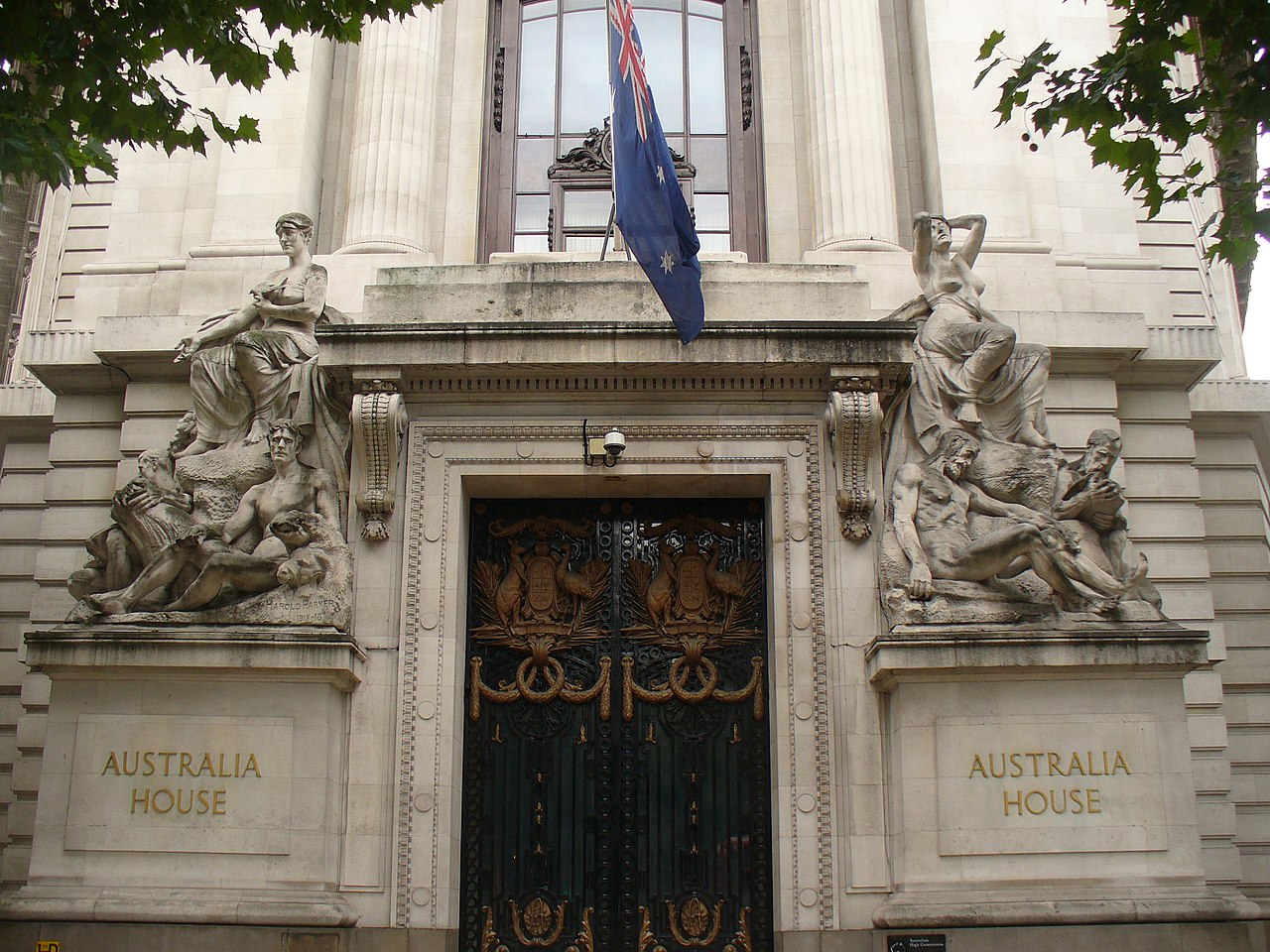

All these insider wheelings and dealings and intrigues amount to nothing but political corruption and influence peddling, which the author of this article seemingly engaged in with enthusiasm. For that he was surely rewarded with high bureaucratic and management positions on the gravy train.
11, 1975, Gough Whitlam, then Prime Minister of Australia, was to inform Parliament about the secret CIA presence in his country, by day’s end, he was out of a job.”
“(R)eleased by the National Archives: November 11, 1975, (Sir John) Kerr infamously sacked the reformist government of prime minister Gough Whitlam, and delivered Australia into the hands of the United States.”
“Today, Australia is a vassal state bar none: its politics, intelligence agencies, military and much of its media are integrated into Washington’s “sphere of dominance” and war plans.”
The CIA runs the “world-order,” delivers the dominate narrative to the White House and policy makers, and the mainstream news outlets. Any country that tries to thwart the CIA will not be allowed to rule its own country. The coup in Australia unseated the best prime minister Australia ever had; one also superior to any president the US ever had.
‘Albo, Deputy Prime Minister Richard Marles and Foreign Affairs Minister Penny Wong met News Corp cochairman Lachlan Murdoch’ ……..Seems that Albo and Penny are turning out to be cute ‘yes’ people – so sad. Will we ever have a leader in the Whitlam league again?
The NY Times, NPR, WaPo, and CNN are just as sinister and pernicious as anything Murdoch’s put out there. In fact, they might be more insidious given that the cool rational observers and smartest people in the room respect these outlets and give them the veneer of uprightness and decency.
Drew,
So true.